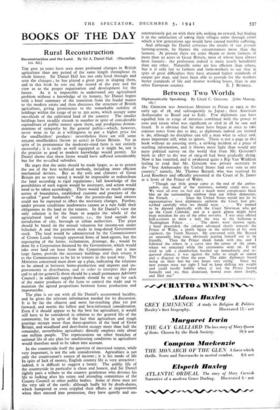BOOKS OF THE DAY
Rural Reconstruction
THE past 50 years have seen more profound changes in British agriculture than any period of the same length throughout its whole history. Sir Daniel Hall has not only lived through and seen the changes; he has played a great part in shaping them, and in this book he sets out the record of the past and his view as to the proper organisation and development for the future. As it is impossible to understand any agricultural problem without a knowledge of its history, Sir Daniel begins with a brief summary of the transition from the feudal manor to the modern estate and then discusses the structure of British agriculture, giving prominence to the remarkable stability of holdings within the range of 50 to 300 acres, which occupy some two-thirds of the cultivated land of the country The smaller holdings have steadily shrunk in number in spite of cons:derable expenditure of public money upon them, and prodigious demon- strations of sympateay by the general public—which, however, never went so far as a willingness to pay a higher price for the smallholders' produce : nevertheless there are still some 200,000 smallholders (below so acres) in Great Britain. Yet in spite of its permanence the moderate-sized farm is not entirely successful ; it is rarely as well equipped as it might be, nor is the practice as good as modern knowledge would permit. Sir Daniel shows that these farms would have suffered considerably but for the so-called subsidies.
He urges that the units should be made larger, sc., as to permit the use of the best technical methods including more efficient mechanical devices. But as the sods and climates of Great Britain are so very varied it would be impossible to redistribute the land according to rigid regulations ; full knowledge of the possibilities of each region would be necessary, and action would need to be taken accordingly. There would be so much cutting- across of boundaries, established customs and practices of the so-called "good husbandry" that the present-day land owners could not be expected to effect the necessary changes. Further, under present conditions landowners cannot as a rule fulfil their obligations to the land or the tenants. In Sir Daniel's view the only solution is for the State to acquire the whole of the agricultural land of the country, i.e., the land outside the jurisdiction of city, borough or urban authorities. The price should be based on the annual valuation for income-tax under Schedule A and the payment made in long-dated Government stock. The land would be administered by the Commissioners of Crown Lands through approved firms of land-agents, but the regrouping of the farms, reclamation, drainage, &c , would be done by a Corporation financed by the Government, which would take over land on lease from the Commissibners, put it into large farms, provide the necessary buildings and then return it to the Commissioners to be let to tenants in the usual way. The Ministers concerned must draw up a plan, indicating the relations to be aimed at between home-production and imports and im- provements in distribution, and in order to interpret this plan and to advise generally there should be a small permanent Advisory Council ; in addition supply-boards should be set up for each of the major products of the farm to control the trade and to maintain the agreed proportions between home production and importatidns.
The plan is set out with all Sir Daniel's accustomed lucidity, and he gives the relevant information needed for its discussion. It is by far the clearest and most far-reaching plan yet put forward, and merits the fullest and best-informed consideration. Even if it should appear to be the best for agriculture, it would still have to be considered in relation to the general life of the community, for in spite of the fact that agriculture and rough grazings occupy more than three-quarters of the land of Great Britain, and woodland and deer-forest occupy more than half the remainder, nevertheless agriculture directly employs only about one million people. The repercussions on other branches of national life of any plan for ameliorating conditions in agriculture would therefore need to be taken into account.
In the countryside itself the question of increased output, while very important, is not the sole consideration. Agriculture is not only the countryman's source of income ; it is his mode of life In spite of lack of money, English country life is very attractive: indeed, it is difficult to suggest a better. The public life of the countryside in particular is clean and honest, and Sir Daniel rightly pays a tribute to the country gentleman who devotes his life to looking after his estate and attending committees of the County Council or other public bodies. Some of these men are the very salt of the earth : although badly hit by death-duties, which hampered or even crippled their efforts at improvement when they entered into possession, they have quietly and un-
ostentatiously got on with their job, seeking no reward, but finding it in the satisfaction of seeing their villages come through crises which a few generations ago would have caused terrible suffering. And although Sir Daniel criticises the results of our present farming-system, he blames the circumstances more than the farmers. At present there are some 86,000 or more farmers of more than 5o acres in Great Britain, most of whom have always been farmers : the profession indeed is more nearly hereditary than any other. Naturally some are less efficient than others, but it is only fair to farmers and farm-workers to say that in spite of great difficulties they have attained higher standards of output per man, and have been able to provide for the workers better standards of life and shorter working hours, than in any






















 Previous page
Previous page